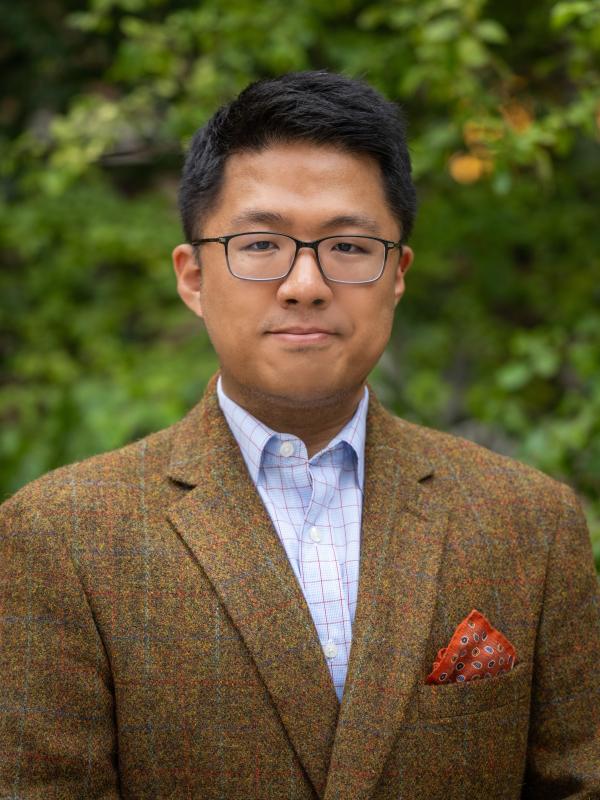
Qian Liu
Assistant Professor of Italian
216 Hagerty Hall
1775 College Road,
Columbus, OH 43210
Office Hours
See course syllabi or by appointment.
Areas of Expertise
- 20th & 21st Century Italian Literature
- Critical & Cultural Theory
- Migration Studies
- Black Italy
- Urban & Environmental Humanities
- Mediterranean Studies
Education
- PhD, University of Michigan (2024)
- MA, University of Michigan (2020)
- MA, Università Ca'Foscari Venezia (2018)
Qian [Mauro] Liu is a transdisciplinary scholar working at the intersection of literature, aesthetics, and critical theory, with a specific focus on Italy’s transnational networks with the Global South. He is currently completing a manuscript, Urban Exergue: Black Spectrality and the Limits of Landscape, which theorizes the aesthetic innovation of Afro-Italian literary and visual productions where urbanscape, as the primary dimension, opens up radical new possibilities for reimagining Italy’s postcoloniality. By delving into the ever-shifting epistemologies of Black urban imaginaries and investigating how disrupted notions of temporal linearity and spatial fixity are articulated, this project paradoxically affirms the presence of Black communities within Italy’s metropolitan centers while embracing the production of multifaceted and multidirectional landscapes that pave the way for imaginations. His second book project, Foundations of Displacement: Aquatic Media and the Ethics of Witnessing, examines how the Mediterranean seawater as a critical elemental medium can shed new light on the political and philosophical perceptions of the refugee crisis.
His scholarship draws widely from continental thoughts, Black critical theories, film and visual arts, and race and ethnicity studies. Reading across languages, he brings contemporary Italy into critical dialogues with other cultural traditions, such as Francophone, Global Sinophone, and American Ethnic cultures. Qian’s writings have appeared in Forum Italicum, Annali d’Italianistica, Modern Italy, Ecozon@, and Italian Contemporary Youth Television (edited volume), among others. He is also an active translator between English, Italian, and East Asian Languages (mainly Mandarin). His most recent invited book-length translations include John Henderson’s Florence Under Siege: Surviving Plague in an Early Modern City (Yale University Press in 2019, Mandarin version in 2023).
He earned his Ph.D. in Romance Languages and Literatures from the University of Michigan (2024), where he was the Richard & Lillian Ives Dissertation Fellow at the Institute for the Humanities (2023-2024). In 2022, he was also a Visiting Fellow at the Giorgio Cini Foundation in Venice, Italy. At Ohio State, Qian curates and leads the New Directions in Italian Studies: Migration and Mobility.
Recent publications:
"The Pitfalls of Transnational Italian Studies?" in H-Net TransItalian Studies, 2024 (invited)
"Between Land and Sea: The Aesthetics of Diasporic Ecologies" in Ecozon@: European Journal of Literature, Culture, and Environment, forthcoming
"Visualizing the Invisible: Zero and Afro-Italian Urban Utopias" in Contemporary Italian Youth Television, Palgrave Macmillan, edited by Luca Barra, Danielle Hipkins, Catherine O'Rawe, and Dana Renga, forthcoming
"Invited Review of Contesting Race and Citizenship; Youth Politics in the Black Mediterranean (by Camilla Hawthorne)," in Altreitalie, 67 Luglio-Dicembre, 2023
"Contesting the Black Flaneur: the rhetoric of disruption and Ubah Cristina Ali Farah's urban literature" in Forum Italicum, 2023, Vol. 57 (3) 938-955
Recent courses:
- FRENCH & ITALIAN 8602 - Care, Intimacy, & Politics (Graduate Seminar)
- FRENCH & ITALIAN 8899 - Dissertation Workshop (Graduate Seminar)
- ITALIAN 2057 - Modern Italian Migrations (General Education)
- ITALIAN 3224 - Post-Unification Italy
- ITALIAN 2102 - Contemporary Italian Society
FRIT 8602 - Comparative French & Italian - Care, Intimacy, & Politics (Fall 2025)
W 2:20pm-5:00pm, Hagerty Hall 206, 3 credit hours, taught in English
What would it mean to re-orient our understanding of social life through the concept and practice of care? Despite its pervasive role in human life, care has long been undervalued as a supplementary service—a solicited reaction rather than an actual form of knowledge. In many cases, care is valued only after a breakdown, crisis, failure, illness, or trauma. Its appearance often signals a triumphant positivism and an uncritically recuperative hope. In this seminar, we will reposition “care” as a fundamental political–ethical concept and rethink care as a way of organizing kinship and political structures. Throughout the semester, we will examine literary and visual works through questions such as: How do mechanisms of care resystematize a breakdown or crisis? How would intentions or acts of care redraw the boundaries of intimacy and distance? In what situations can care be considered a relational and mutual process for both the caregiver and the cared-for? How does care propose new spatial-temporal coordinates? What role does care play in nuancing the limits of the human and the non-human?
This course will introduce students to theoretical texts on care and related topics (migration, feminist resistance, queer intimacy, disability, friendship, posthumanism). Some of the theorists we will engage with include Jacque Derrida, Juan Tronto, Giorgio Agamben, Michel Foucault, Carol Gilligan, Hannah Arendt, Silvia Federici, Boris Groys, Sarah Ahmed, Fabienne Brugère, Roberto Esposito, Daniel Engster, and Maria Puig de la Bellacasa. We will also explore a wide range of literary and visual texts by Annie Ernaux, Ousmane Sembène, Sarah Bouyain, Charlotte Delbo, Philippe Lioret, Emanuele Crialese, Andrea Segre, Elena Ferrante, Alice Rohrwacher, Domenico Starnone. All secondary materials will be available in English; doctoral students in French and Italian are encouraged to read these texts in their original language.
